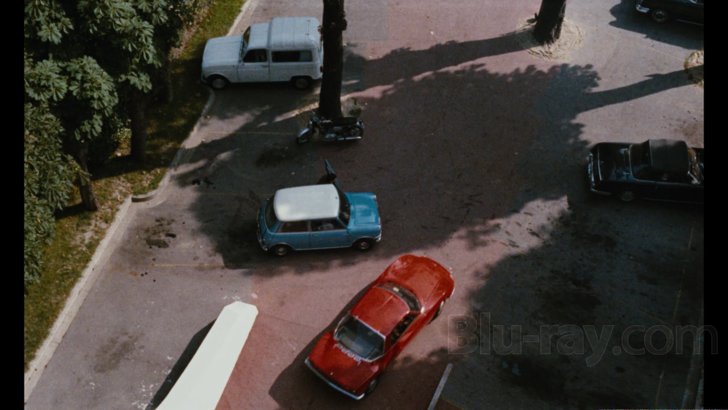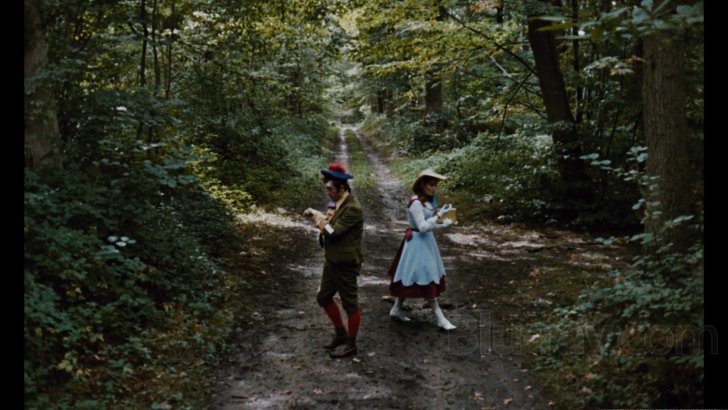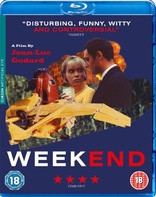Weekend Blu-ray Movie
HomeWeekend Blu-ray Movie 
Le week-endArtificial Eye | 1967 | 104 min | Rated BBFC: 18 | Jul 30, 2018
Movie rating
6.9 | / 10 |
Blu-ray rating
| Users | 0.0 | |
| Reviewer | 5.0 | |
| Overall | 5.0 |
Overview
Weekend (1967)
Determined to collect an inheritance from a dying relative, a bourgeois couple travel across the French countryside while civilization crashes and burns around them.
Starring: Mireille Darc, Jean Yanne, Jean-Pierre Kalfon, Jean-Claude Guilbert, Jean-Pierre LéaudDirector: Jean-Luc Godard
| Foreign | Uncertain |
| Drama | Uncertain |
| Surreal | Uncertain |
| Dark humor | Uncertain |
| Comedy | Uncertain |
| Adventure | Uncertain |
Specifications
Video
Video codec: MPEG-4 AVC
Video resolution: 1080p
Aspect ratio: 1.66:1
Original aspect ratio: 1.66:1
Audio
French: LPCM 2.0
Subtitles
English
Discs
Blu-ray Disc
Single disc (1 BD)
Playback
Region B (locked)
Review
Rating summary
| Movie | 5.0 | |
| Video | 5.0 | |
| Audio | 5.0 | |
| Extras | 4.0 | |
| Overall | 5.0 |
Weekend Blu-ray Movie Review
Reviewed by Dr. Svet Atanasov August 5, 2018Nominated for Golden Bear Award at the Berlin International Film Festival, Jean-Luc Godard's "Week End" a.k.a. "Weekend" (1967) arrives on Blu-ray courtesy of Curzon/Artificial Eye. The supplemental features on the disc include four archival interviews with directors Mike Figgis, Patrice Leconte, and Claude Miller, and scenarist Antoine de Baecque. In French, with optional English subtitles for the main feature. Region-B "locked".

Battleground
This review below was initially used for Criterion's release of Weekend in 2012.
Jean-Luc Godard’s Weekend has a basic plot but paying attention to it isn’t required. Paying attention to what the various characters in the film have to say, however, is crucial.
The film opens up with a strange sequence in which a young man and a young woman observe from the balcony of their apartment another man and a woman beating up a man with a chain. They have nice cars. One is blue, the other red. Next to them there is another, white car.
Later on, the young woman from the balcony carefully describes to her friend a casual encounter she had with a couple. The three made love and the woman liked the experience. She felt strange afterwards. Now she no longer thinks that she should have.
After the confession about her threesome experience the woman, Corinne (Mireille Darc, Man in the Trunk, The Tall Blond Man With One Black Shoe Collection), and her husband, Roland (Jean Yanne, Le Boucher, Indochine), head to the countryside with their fancy car to collect an inheritance from a seriously sick relative. But it just so happens that this is the beginning of the weekend and other couples and families are also trying to leave the city. Many of them also drive fancy cars.
On the outskirts of the city there is already a massive traffic jam. Many of the drivers have turned off their cars and started talking to each other. Some are fighting. The really bored ones have started playing games, while others have started drinking. Somehow Roland manages to find a way out of this mess, but not before various angry men threaten to end his life.
Later on, Corinne and Roland pass by plenty of crashed cars and corpses rotting on the side of the road. Then they pick up an amateur wizard and his kooky girlfriend who demands that they drive them to London. If they agree, the wizard would grant them their wishes. If they don’t, he will be forced to use his gun. But Roland steals the gun and the wizard and his girlfriend are chased away.
Eventually, Corinne and Roland also crash their car. They decide to walk through the nearby forest where they meet all sorts of strange characters, including the great revolutionary leader Saint-Just (Jean-Pierre Leaud, The 400 Blows, The Pornographer) and the lovely Emily Bronte (Blandine Jeanson). Before they can get back to civilization, a gang of radical leftists kidnap them.
Weekend is loosely divided into two sections. The first has a slightly lighter and more casual tone. There are various quite hilarious episodes where Godard gently and not so gently satirizes the French middle class. This section is closer to what one would describe as political theater.
The second section has a strong surrealist flavor. It is also filled with numerous long statements promoting revolutionary action. There are references to endless literary works and films (ranging from Tom Thumb to Luis Bunuel’s The Exterminating Angel), important historical figures, and social events.
Ultimately, Weekend feels like a giant test created to measure one’s knowledge of history, literature, art, and politics. To appreciate its genius, one ought to be familiar with all of the events and works the film references. Otherwise, at times the viewing experience could be quite frustrating, even maddening.
Godard shot Weekend with the great cinematographer Raoul Coutard (Shoot the Piano Player, Le mépris, Z). Needless to say, the camera work and the use of color and light are all quite unique. There are a few particularly interesting long continuous shots, such as the one where the camera follows the long line of cars in the countryside, that have become legendary.
The great writer and director Claude Miller, who passed earlier this year, was the second unit director on Weekend. Two years after Weekend was completed, he shot his first short film. Some of Miller's best films are Deadly Circuit (1983), Class Trip (1998), and La petite Lili (2003). Miller's final film, Thérèse Desqueyroux, was screened at this year's edition of the Cannes Film Festival.
*In 1968, Weekend was nominated for the prestigious Golden Bear Award for Best Film at the Berlin International Film Festival.
Weekend Blu-ray Movie, Video Quality 

Presented in its original aspect ratio of 1.66:1, encoded with MPEG-4 AVC and granted a 1080p transfer, Jean-Luc Godard's Weekend arrives on Blu-ray courtesy of Curzon/Artificial Eye.
The release is sourced from the restored 2K master that French label prepared a few years ago and Criterion worked with for the U.S. release of Weekend. I like the restoration a lot. It gives the film a very consistent fresh look that is free of serious digital anomalies. In terms of image stability there are also some very dramatic improvements over previous DVD releases that ensure a very different viewing experience. I think that the color grading is convincing as well -- there are strong primaries and a very good range of healthy nuances. Finally, there are absolutely no traces of age-related imperfections. Truly, if you enjoy the film, do not hesitate to upgrade your DVD release. (Note: This is a Region-B "locked" Blu-ray release. Therefore, you must have a native Region-B or Region-Free player in order to access its content).
Weekend Blu-ray Movie, Audio Quality 

There is only one standard audio track on this Blu-ray release: French LPCM 2.0. Optional English subtitles are provided for the main feature.
There is quite a bit of action throughout the film that ensures plenty of rather impressive dynamic intensity. On the other hand, this is still a period production that embraces a variety of organic sounds and noises -- which is very typical for Jean-Luc Godard's films from the same era -- so do not expect the type of oomph that contemporary blockbusters deliver. The lossless track simply replicates the native qualities of the original soundtrack very well.
Weekend Blu-ray Movie, Special Features and Extras 

- Interview with Claude Miller - in this archival interview, director Claude Miller (Deadly Circuit) recalls his fascination with the early New Wave films (Le Beau Serge, Les Cousins), and discusses the new cinematic language/style that they promoted (the humor/witticism), his work on The Young Girls of Rochefort, and eventually his contribution to Weekend. The interview was conducted in Paris on July 22, 2010. In French, with optional English subtitles. (25 min).
- Interview with Patrice Leconte - in this archival interview, director Patrice Leconte (The Girl On The Bridge) recalls his first encounter with Jean-Luc Godard and the enormous impact Breathless had on him, the freedom and lightness that the New Wave films promoted and how they solidified his decision to become a filmmaker, the purpose of his rebellion and the evolution of his style, the meaning of his statement "tracking shots are a moral issue", etc. In French, with optional English subtitles. (35 min).
- Interview with Antoine de Baecque - in this archival interview, writer Antoine de Baecque (Two In The Wave) discusses Jean-Luc Godard's public image during the 1960s, the conception of Weekend and the very specific place that it has in the director's body of work, the unique casting choices, the notorious tracking shot, etc. The interview was conducted in Paris on July 28, 2010. In French, with optional English subtitles. (11 min).
- Filmmaker Mike Figgis on Weekend - in this archival interview, director Mike Figgis (Leaving Las Vegas) remembers his first viewing of Weekend and discusses some of the more interesting themes in it, Jean-Luc Godard's understanding of the psychology of music and its purpose in cinema, the theatrical quality of his work and how it makes it avant-garde, his understanding of the power of text and the manner in which he utilizes it, etc. In English, not subtitled. (24 min).
Weekend Blu-ray Movie, Overall Score and Recommendation 

Hilarious, disturbing and enormously thought-provoking, Weekend is arguably the most effective of Jean-Luc Godard's radical films. Curzon/Artificial Eye's recent Blu-ray release is sourced from Gaumont's excellent 2K remaster of the film and features four outstanding interviews, of which only one is included on Criterion's North American release. Folks in Region-B territories that like the film should definitely seek to upgrade their DVD releases. VERY HIGHLY RECOMMENDED.
Similar titles
Similar titles you might also like

Vivre Sa Vie
My Life to Live
1962

La Chinoise
Arrow Academy
1967

La Règle du Jeu
The Rules of the Game
1939

Y Tu Mamá También
And Your Mother Too
2001

Il Sorpasso
The Easy Life | Limited Edition
1962

Breathless 4K
À bout de souffle / Vintage World Cinema
1960

The Square
2017

Hi, Mom!
1970

Jules and Jim
Jules & Jim / Jules et Jim
1962

The Discreet Charm of The Bourgeoisie 4K
Le charme discret de la bourgeoisie | Vintage World Cinema | 50th Anniversary Edition
1972

Force Majeure
Turist
2014

May Fools
Milou en Mai
1990

Goodbye to Language 3D
Adieu au Langage 3D
2014

The Flower of Evil
La fleur du mal
2003

The Image Book
Le livre d'image
2018

Zama
2017

Daisies
Sedmikrásky
1966

Persona
1966

Masculin Féminin
1966

The Idiots
Idioterne
1998
